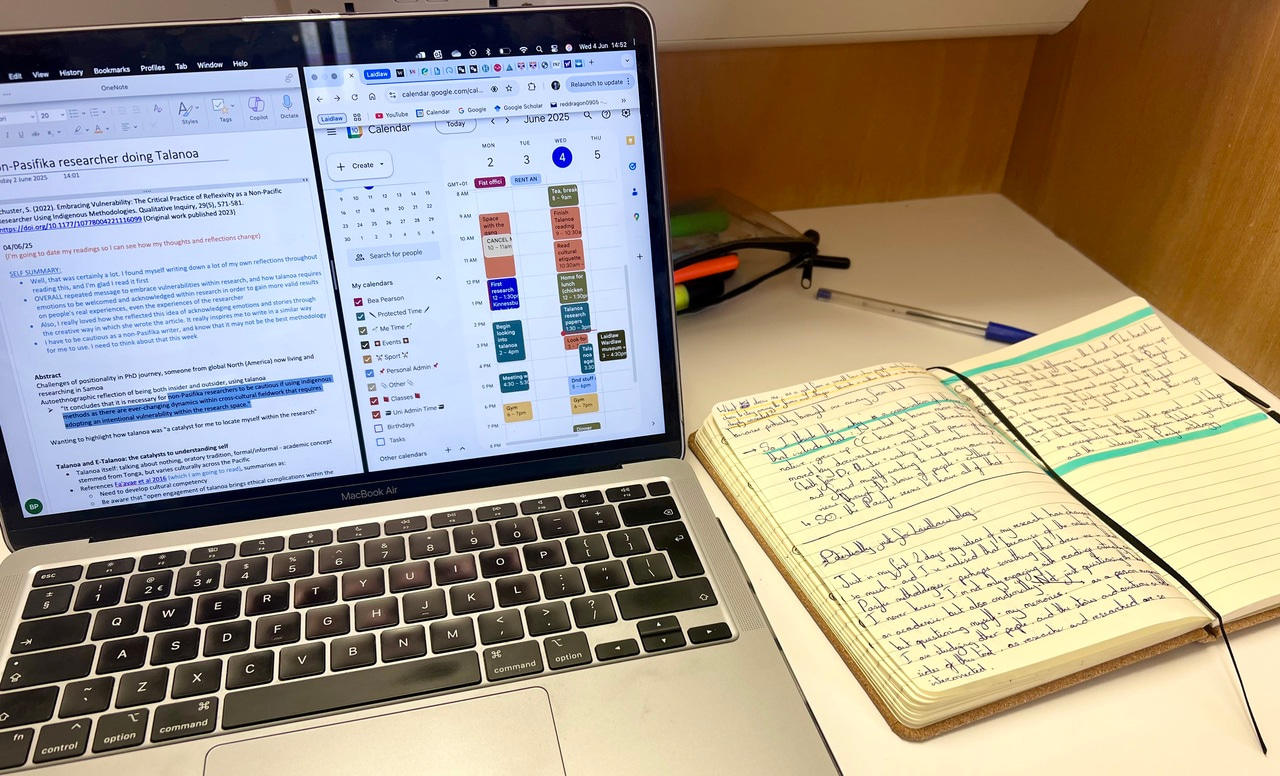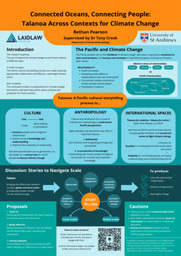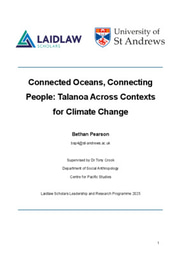Laidlaw Research Week 1: Stepping Into The Ocean

I knew going into research would likely change my worldview, but I never expected it to have such an encompassing effect in just the first 3 days. It’s fair to say that the very beginning of the research period has had its ups and downs, and I’ve never felt so strongly that I’ve thrown myself into the deep end. It is this idea of treading into unknown waters that has surrounded me in the first week of research (and admittedly overwhelmed me for most of the week) – an idea provoked by my very first reading and happened to be one that I found particularly inspiring, moving, and challenging all at once.
Firstly, the big thing that has encompassed my first week of research is that there is a holism to Pacific worldviews that has immediately become clear to me. It seems to have me thinking in circles, or in push and pull, and it encompasses everything from the research itself to my personal life. This holism was raised in my first reading and has been made clear throughout every reading on Pacific culture since. While the concept itself is something I find deeply fascinating, the extent to which it has affected my own perspective of the world has left me reeling. As a result, while I’d like to somehow convey Pacific worldviews here and how my research will play into this, I feel I can’t quite put it into words yet – perhaps because of the difficulty and ethical inability to translate such a concept into a distilled, Westernised idea in just a few sentences. For now, I’ll leave you with my reflections on my first reading from last week – you can look forward to potential academic discussion on Pacific worldviews in another blog post.
My notes after reading Schuster’s auto-ethnography titled ‘Embracing Vulnerability: The Critical Practice of Reflexivity as a Non-Pacific Researcher Using Indigenous Methodologies’ (2022) are densely colour coded in a melting pot of thoughts that are relevant to my research, things I found inspiring, quotes that provoked intense thinking, and methodological insight into being an outsider to Pacific research. She focused primarily on embracing the vulnerability of being a non-Pasifika person conducting the indigenous methodology of talanoa (a method I was encouraged to look into by three Pacific women I met with before the research period). In embracing this vulnerability, a wide variety of other factors such as storytelling and a deep reflection on memories both within and outside the research context was raised, and it’s fair to say I’ve never had a reading give me so much to think about. Just as the author was sharing her own reflections in a creatively and sincerely written manner, I began making my own reflections and becoming compelled by the necessity to conduct my research in this more Pacific-like mindset grounded in stories.
Such stories have had me reflecting on my life – from my hope to write more blog posts to how events in my life thus far have drawn me to this research question. I was asked by my research supervisor in November, and by a Pacific interlocutor just last week: ‘Why the Pacific?’. The answers I gave back then suddenly seem superficial to me now that I’ve realised the importance of my stance – my story – within this research. My current reflections have had me searching my story from as far back as I can remember, and wondering what drew me – a girl from a disconnected rural county that some people don’t ever leave – towards voyaging cultures on the other side of the world that are so expansive and ancient?
On the other hand, it was only into the latter half of that week that I connected the dots between this research and another, more recent aspect of my life: my desire to be a documentary producer. For years now I have believed that emotional and inspiring storytelling is key to conveying the importance of the climate crisis to people, and this belief has followed me through everything from casually watching documentaries to my application for Laidlaw. I kicked myself when it took me so long to realise the connection between this belief and the importance of storytelling in Pacific culture and question if this is perhaps another part of what drew me to Pacific perspectives. More importantly, I think the realisation of this connection and its equal importance to some of my childhood memories portrays the significance of holism and storytelling that I have been mentioning – realising how different aspects of my life are already connected to this research, always has been and always will be. However, if this doesn’t make much sense at the moment: don’t worry. It hasn’t been making a whole load of sense to me either, it just gives you some insight into how unexpectedly and messily this first week of research has been coming together in my mind.
In realising the importance of these stories to me, it has also become clear to me that my research must embrace and accurately portray the stories of Pacific students. In doing so, I’ve realised that my primary research can’t simply rely on interviews but instead would fit more appropriately within the Indigenous methodology of talanoa. Within this, I could have genuine two-sided conversations with my participants that would involve vulnerability and contribution from my perspective just as much as theirs. While this seems like the most sincere and culturally engaging approach, a variety of readings have also warned against the use of Talanoa as someone who is not a Pacific person, and as someone who is unable to have in-person conversations with Pacific people for this research. As a result, I’ve been fairly stumped this past week and unsure what approach to take. Why do academics have to disagree on such culturally sensitive issues?
It is because of this combination of inspiration, caution and new-found holistic perspective that I’ve really struggled this past week. Even though I have a specific research question and a specific timeframe as a Laidlaw scholar, this seems like a paradoxically endless and intimate project. Even from the day before the research period – holding my first conversation with three Pacific women – it dawned on me that I may have stepped in to my entire academic career path here. So, if I’m discovering the endless oceans beyond the island of what I already know, where do I draw the line for the end of that voyage, and how do I become comfortable with knowing that there could always be more out there?
Despite having found myself overwhelmed by these thoughts in the first week, I write this on the Monday of Week 2 in the hopes of getting back on track. I’ve panicked and struggled to swim in these unknown waters for long enough, and its time I pick a course and see where the currents take me. I’ve accepted that within the holism of Pacific worldviews, if I’m going to embark beyond the island that is Western thought, I have to accept that I can’t understand all of the ocean at once, even though I know the expanse that is out there.
References
Schuster, S. (2022) ‘Embracing Vulnerability: The Critical Practice of Reflexivity as a Non-Pacific Researcher Using Indigenous Methodologies’ Qualitative Inquiry, 29(5), 571-581. https://doi.org/10.1177/10778004221116099




Please sign in
If you are a registered user on Laidlaw Scholars Network, please sign in
What an incredible blog post, Bea! It is inspiring to see you navigate the complexities of your research project with such a positive attitude. I've said this before, and I will say it again: it is admirable how determined you are. I cannot wait to see how your worldview changes at the end of the research period.